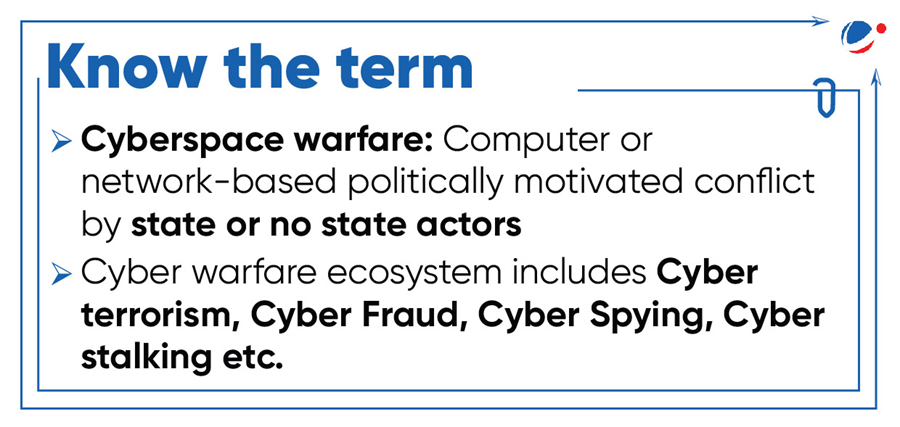Why in the news?
Chief of Defence Staff (CDS) released India's first Joint Doctrine for Cyberspace Operations.
More on the news
- The Joint Doctrine for Cyberspace Operations (JDCO) lays emphasis on understanding military aspects of cyberspace operations.
- The move highlights how Cyberspace has emerged as crucial domain in modern warfare, in addition to traditional domains of Land, Sea, and Air.
About Cyber Space
- Cyberspace refers to the global volume of entities (such as Information and communication technology (ICT) systems) processing, storing and transmitting digital information and code, regardless of whether they are connected or not.
- Military Advantages of operating in cyberspace: Real time intelligence gathering, offensive and defensive operations, Improved Communication, Signal Intelligence etc.
- Vulnerabilities of operating in cyberspace: Cyberspace warfare or Cyber-attacks can disable official websites and networks, disrupt or disable essential services, steal or alter classified data, cripple financial systems etc.

Significance of the doctrine
- Provides conceptual guidance to commanders of armed forces, staff and practitioners in planning and conducting Cyberspace Operations.
- Promotes Jointness and Integration of three services (Army, Navy and Air Force), apre-requisite to the creation of functional integrated theatre commands.
- Competing globally, as counties like China have developed significant cyberwarfare capabilities, including cyberweapons to degrade or destroy adversaries' military assets and strategic networks.
- Preventing hostile actions in cyberspace, which can impact nation's economy, cohesion, political decision-making, and ability to defend itself.
Other Measures taken for Strengthening cyberspace capabilities in India
|
Conclusion
The doctrine is poised to shape future military strategies and operations, reinforcing the integral role of cyberspace in national defence.
About Chief of Defence Staff (CDS)
|






